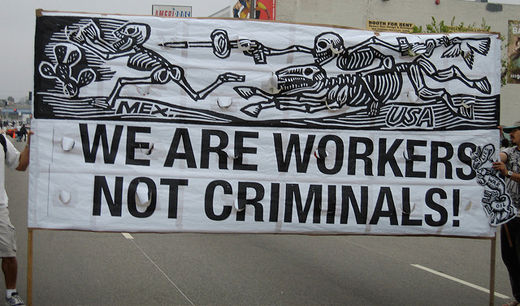
WASHINGTON – Assigned, more or less, by Congress to reach agreement on how many low-wage “guest workers” to admit to the U.S. – and which ones – the AFL-CIO and the U.S. Chamber of Commerce announced March 30 they reached a tentative deal on the issue.
Now all they must do is convince their members, and lawmakers, to go along. When it comes to Congress, and especially its ruling right wing bloc in the U.S. House, that may be easier said than done. And the nativist Right is already mobilizing.
The agreement, announced by federation President Richard Trumka, comes as a bipartisan Senate “Gang of Eight” plans to unveil a comprehensive immigration reform plan during the second week of April. Unions will hold a pro-reform D.C. rally April 10.
The senators’ plan would include not just the provisions covering low-wage workers, but also set up a path to eventual legalization and citizenship for the 11 million undocumented people now in the U.S., institute stricter border controls and mandate an accurate system employers must follow to verify a potential worker’s status.
“Each day we hear from working people of every background that we need a fair (immigration) system that lifts up everyone,” Trumka’s brief statement said.
“The strength of the consensus for just reform afforded us the momentum needed to forge an agreement in principle to develop a new type of employer visa, collect and analyze labor market data, as well as significant worker protections. We expect this new program, which benefits not just business, but everyone, will promote long-overdue reforms by raising the bar for existing programs,” he added.
The new visas would cover “non-agricultural guest workers” in sectors such as construction, hospitality, health care and janitorial services. Details include:
- A new visa program, replacing the H-2B visas such low-wage workers now get. The new visas would give the workers more protections, such as not being dependent on individual employers to stay in the U.S. That would let workers change jobs and better themselves. The workers could also eventually petition for permanent residency.
- Certification of foreign labor recruiters, to reduce exploitation of low-wage applicants. That exploitation appears everywhere from high-tech workers brought from Mexico to Silicon Valley to construction workers imported from the Philippines and kept in slave-labor like conditions in Louisiana.
- Establishment of a Bureau of Immigration and Labor Market Conditions within the Citizenship and Immigration Service. The bureau, a non-partisan, non-political group, would analyze employment conditions in industries that seek low-wage workers.
The bureau would determine how many workers those industries actually need, how many U.S. workers are available and then set visa numbers, industry by industry. Right now, there is an overall visa limit of 165,000-195,000 yearly, which industries routinely try to violate and have lobbied to increase. The Economic Policy Institute says business wants 400,000 visas yearly.
The program would start with 20,000 visas in 2015 and gradually increase to 75,000 visas in 2018. After that, the bureau would adjust the number of visas depending on the state of the economy. There would be a yearly maximum of 200,000 visas and within that a yearly maximum of 15,000 for construction workers.
The guest workers would be paid either the wage level for U.S.-born workers with similar experience or the “prevailing industry wage,” the federation-chamber framework says. Many of the workers now earn either far less than the wages of their U.S. counterparts or are not paid the prevailing wage, or both.
“A new visa program is only a small part of our campaign to build a common sense immigration system,” Trumka said. Mass deportations are a moral and economic crisis. Senseless thwarting of efforts to live the American dream is a crisis. And we are leading a national campaign for reform that addresses these crises.
“From making sure citizenship for the 11 million is achievable not only in theory, but in fact, to maintaining family unity, the labor movement’s immigration campaign is just getting started,” he declared.
Photo: A sign from a march of undocumented workers. Unions will rally for immigrant rights on April 10 in Washington D.C. Sam Felder/Flickr (CC)












Comments